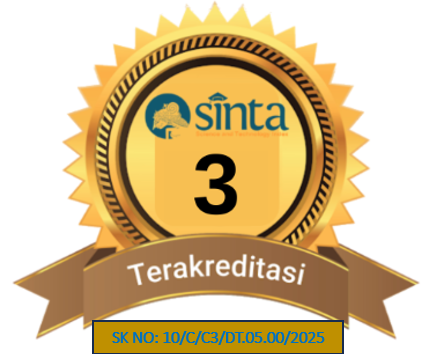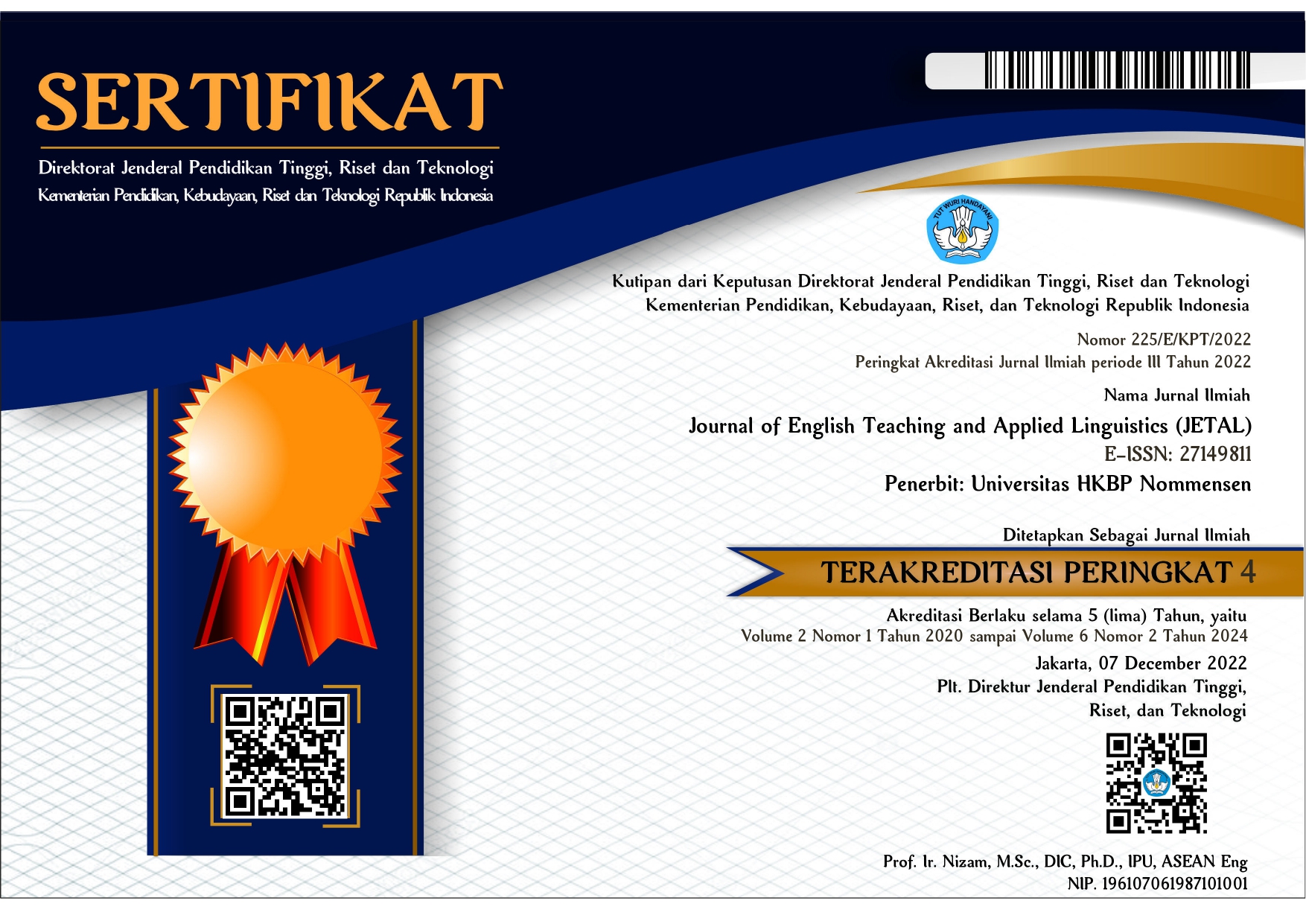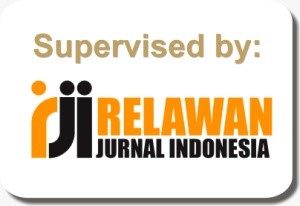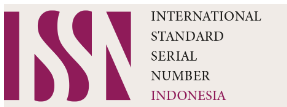Uncovering the Link between Students' Attitude toward Reading and their Comprehension Abilities
Abstract
Reading attitude gives good influence to reading comprehension achievement. It means that, those who have good reading attitude will be also have a good reading comprehension achievement. However, based on the preliminary research, the teacher revealed that students who had basic comprehension showed ability while reading, but some other students felt lazy, even before reading the text. Therefore, This study sought to establish a correlation between students' reading attitudes and reading comprehension achievement at SMA Muhammadiyah 1 Palembang. This research is a correlational study. There were two types of instruments used to collect data. The researcher employed a questionnaire to assess reading attitude, and a multiple-choice reading comprehension test. The research population consisted of 426 students. The researcher then took 105 students as the sample using random sampling technique. By using Pearson Product Moment on SPSS in analyzing the data, the researcher found that the sig. t was 0.114, higher than the significant alpha of 0.05 (sig.t > 0.05). It demonstrates Ho1 is accepted, or that there is a negative significant correlate between the students' reading attitude and reading comprehension. The writer also discovered that reading attitude has little impact on the 1.5% reading comprehension achievement at SMA Muhammadiyah 1 Palembang. The remaining 98.5 percent was influenced by various factors.
References
Bastug, M. (2014). The structural relationship of reading attitude, reading comprehension, and academic achievement. International J. Soc. Sci. & Education, 4(4), 931-946.
Braden, M. J. (2012). Impacting attitudes towards reading in the second grade classroom: a reading role model intervention [Doctoral dissertation, Wichita State University].
Clark, C., & Rumbold, K. (2006). Reading for pleasure: A research overview. National Literacy Trust.
Conradi, K., Jang, B. G., Bryant, C., Craft, A., & McKenna, M. C. (2013). Measuring adolescents' attitudes toward reading: A classroom survey. Journal of Adolescent & Adult Literacy, 56(7), 565-576. doi:10.1002/JAAL.183
Creswell, J. W. (2012). Educational research: Planning, conducting, and evaluating quantitative and qualitative research (4th ed.) Pearson Education International.
Donaldson, N. (2010). The fourth grade slump: The relationship between reading attitudes and frequency of reading, 1(2). http://etd.ohiolink. edu/view.cgi/Donaldson%20Nicole.pdf?bgsu1269142631
Gregory, R. J. (2004). Psychological testing: history, principles, and application (4th ed.) Pearson Education Group, 483. http://www.crie.org.nz/research_paper/c_griffi ths_op1.pdf
Guthrie, J. T. & Wigfield, A. (2000). Engagement and motivation in reading.
Hanani. F. (2018). The correlation between students’ reading attitude and their writing ability at the second year of islamic senior high school al-ma’arif mantiasa meranti regenc. [Undergraduate thesis, UIN Sultan Syarif Kasim Riau Pekanbaru].
Indrawati, I., Marto, H., & Ngoyo, M. E. (2020). The students’attitude and reading comprehension toward english achievement. Jurnal Madako Education, 6(1). https://ojs.umada.ac.id/index.php/jme/article/view/112
Lane, H. B., & Hayes, L. F. (2015). Keeping the big picture in mind: Using a reading conceptual framework to guide teacher learning. Journal of Reading Education, 40(2).
Masarogulları, G. & Kocakgöl, M. (2011). Psikoloji Sözlüğü. Nobel Yayıncılık.
Mathewson, G. C. (2004). Model of attitude influence upon reading and learning to read. In R. B.
Maulidasari, I., Mulyadi, & Tahrun. (2021). The correlation among language learning strategies, reading attitude, and reading achievement of the eleventh grade students of state senior high schools of lahat district. Jurnal Pendidikan Tambusai, 5(1), 2583-2590. https://doi.org/10.32698/10.32698/01372
McKenna, M. C., Conradi, K., Lawrence, C., Jang, B. G., & Meyer, J. P. (2012). Reading attitudes of middle school students: Results of a US survey. Reading Research Quarterly, 47(3), 283-306.
Morgan, P. L., & Fuchs, D. (2007). Is there a bidirectional relationship between children’s reading skill and reading motivation? Exceptional Children, 73(2), 165-183.
Murtafi’ah, B., & Putro, N.H.P.S. (2020). Gender differences in santri’s reading attitude and motivation. EduLite: Journal of English Education, Literature, and Culture, 5(2), 251-262. http://dx.doi.org/10.30659/e.5.2.251-262
Pramuji, A. (2015). The correlation among attitude, reading comprehension, and writing achievement of english education study program students of sriwijaya university. Jurnal Adminika. 1(1).
Sadeghi, K. (2007). The key for succesfull reader-writer interaction: Factors affecting reading comprehension in L2 revisited. Asian EFL Journal, 9(3), 198-220.
Scholl, R. W. (2002). Attitudes and attitudes change. Journal of Classification, 3, 1 – 35. http://www.cba.uri.edu/Scholl/Notes/AffectiveMotivation
Septianingsi, P., & Atmanegar, Y. (2021). The influence of english reading attitude on students’ reading comprehension. Journal of English Education 2(2).
Smith, S. A., & Li, Z., (2020). Closing the enjoyment gap: heritage language maintenance motivation and reading attitudes among Chinese-American children. Int. J. Biling. Educ. BiLing. 1-18 (in press).
Sugiyono. (2016). Metode penelitian pendidikan: Pendekatan kuantitative, kualitative, dan R&D. Alfabeta.
Tisa, F., Sofendi, S., & Eryansyah, E. (2021). Reading and its relationships among attitude, motivation, and comprehension achievement in upper secondary school students. JEES (Journal of English Educators Society), 6(1), 42-51. https://doi.org/10.21070/jees.v6i1.751
Tullock-Rhody, R., & Alexander, J. E. (1980). A scale for assessing attitudes towards reading in secondary schools. Journal of Reading, 23(7), 609-614. http://www.jstor.org/stable/40017004
Umre & Kamil. (2012). The correlation between student’s attitude towards english and their english proficiency of the eleventh grade students of sman 3 gedangsari. [Undergraduate thesis, Universitas Semaran].
Zulhidah. (2014). Understanding research methodology in english language teaching. Cadas press.
Zygouris-Coe, V. (2009). Teaching reading comprehension skills. Middle Matters. 17(4), 1-2.

This work is licensed under a Creative Commons Attribution-ShareAlike 4.0 International License.
Authors retain copyright and grant the journal right of first publication with the work simultaneously licensed under a Creative Commons Attribution-ShareAlike 4.0 International License (CC BY-SA 4.0) that allows others to share the work with an acknowledgment of the work's authorship and initial publication in this journal.
Authors are able to enter into separate, additional contractual arrangements for the non-exclusive distribution of the journal's published version of the work (e.g., post it to an institutional repository or publish it in a book), with an acknowledgment of its initial publication in this journal.
Authors are permitted and encouraged to post their work online (e.g., in institutional repositories or on their website) prior to and during the submission process, as it can lead to productive exchanges, as well as earlier and greater citation of published work (See The Effect of Open Access).







